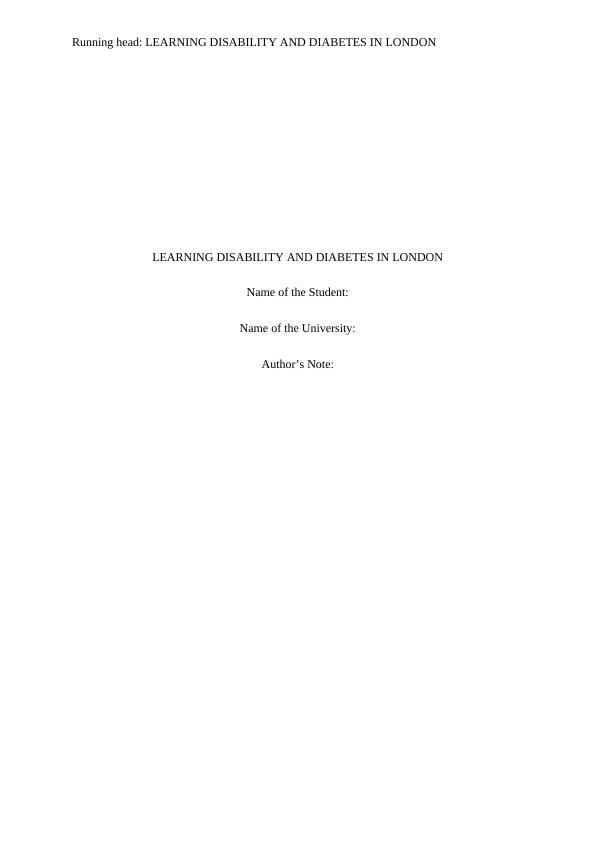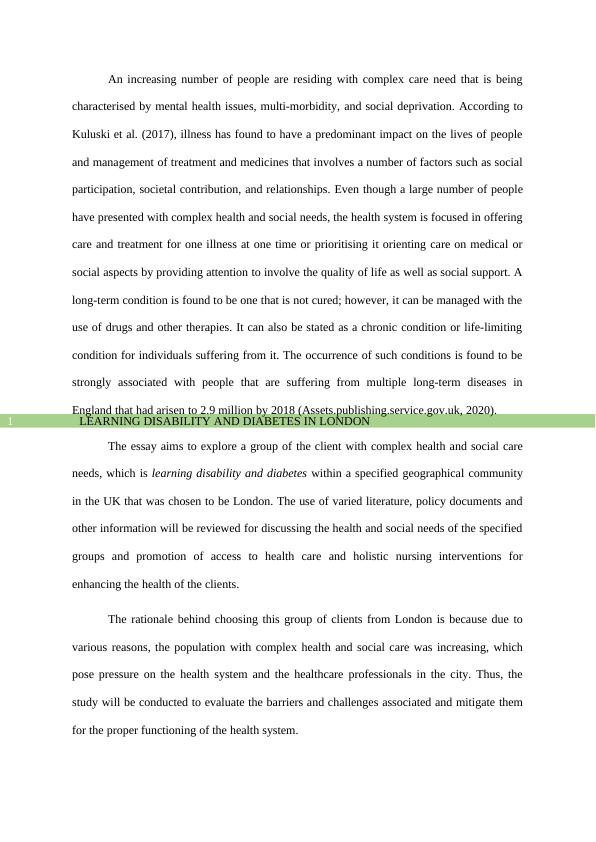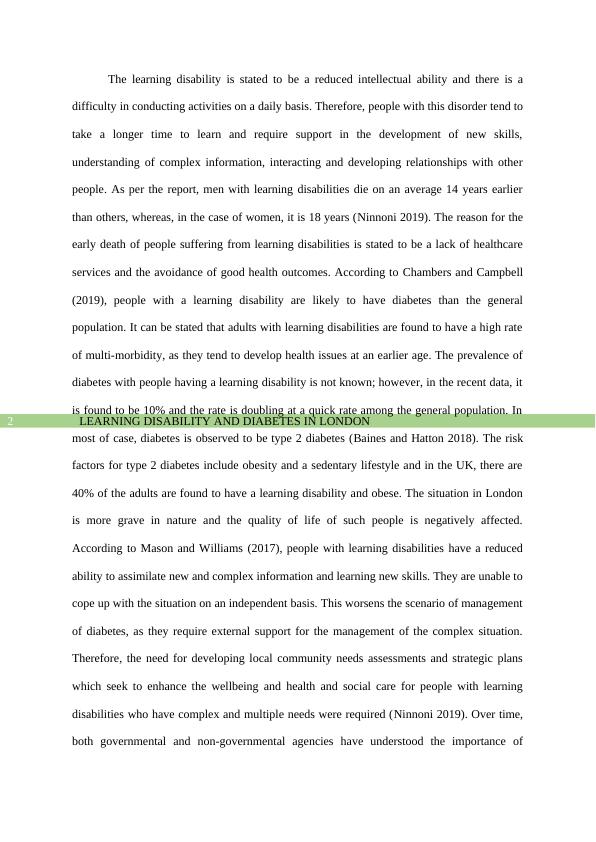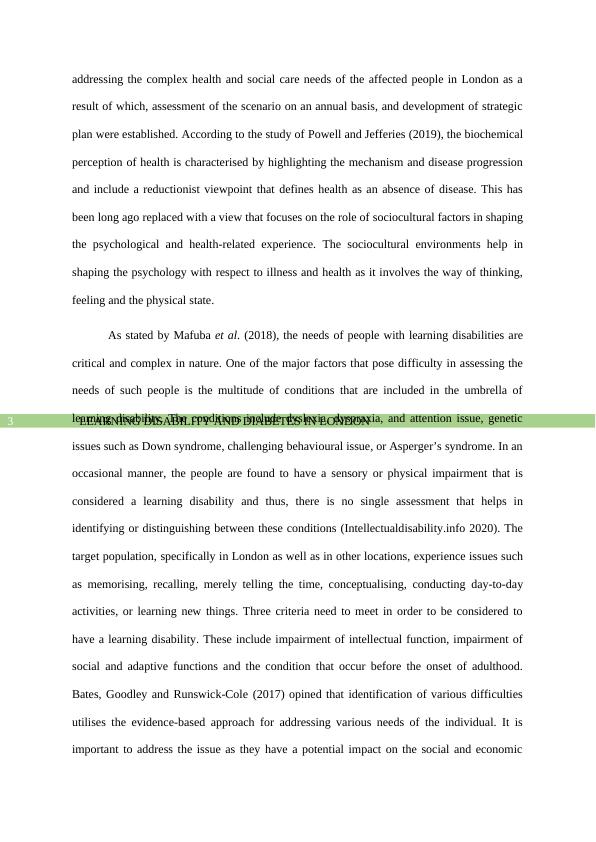Assignment on Learning Disability and Diabetes in London
An exploration of the health and social care needs of people with learning disabilities and diabetes in London, including barriers to accessing healthcare and interventions to support recovery and enhance wellbeing.
14 Pages4538 Words18 Views
Added on 2022-08-17
Assignment on Learning Disability and Diabetes in London
An exploration of the health and social care needs of people with learning disabilities and diabetes in London, including barriers to accessing healthcare and interventions to support recovery and enhance wellbeing.
Added on 2022-08-17
ShareRelated Documents
Running head: LEARNING DISABILITY AND DIABETES IN LONDON
LEARNING DISABILITY AND DIABETES IN LONDON
Name of the Student:
Name of the University:
Author’s Note:
LEARNING DISABILITY AND DIABETES IN LONDON
Name of the Student:
Name of the University:
Author’s Note:

LEARNING DISABILITY AND DIABETES IN LONDON1
An increasing number of people are residing with complex care need that is being
characterised by mental health issues, multi-morbidity, and social deprivation. According to
Kuluski et al. (2017), illness has found to have a predominant impact on the lives of people
and management of treatment and medicines that involves a number of factors such as social
participation, societal contribution, and relationships. Even though a large number of people
have presented with complex health and social needs, the health system is focused in offering
care and treatment for one illness at one time or prioritising it orienting care on medical or
social aspects by providing attention to involve the quality of life as well as social support. A
long-term condition is found to be one that is not cured; however, it can be managed with the
use of drugs and other therapies. It can also be stated as a chronic condition or life-limiting
condition for individuals suffering from it. The occurrence of such conditions is found to be
strongly associated with people that are suffering from multiple long-term diseases in
England that had arisen to 2.9 million by 2018 (Assets.publishing.service.gov.uk, 2020).
The essay aims to explore a group of the client with complex health and social care
needs, which is learning disability and diabetes within a specified geographical community
in the UK that was chosen to be London. The use of varied literature, policy documents and
other information will be reviewed for discussing the health and social needs of the specified
groups and promotion of access to health care and holistic nursing interventions for
enhancing the health of the clients.
The rationale behind choosing this group of clients from London is because due to
various reasons, the population with complex health and social care was increasing, which
pose pressure on the health system and the healthcare professionals in the city. Thus, the
study will be conducted to evaluate the barriers and challenges associated and mitigate them
for the proper functioning of the health system.
An increasing number of people are residing with complex care need that is being
characterised by mental health issues, multi-morbidity, and social deprivation. According to
Kuluski et al. (2017), illness has found to have a predominant impact on the lives of people
and management of treatment and medicines that involves a number of factors such as social
participation, societal contribution, and relationships. Even though a large number of people
have presented with complex health and social needs, the health system is focused in offering
care and treatment for one illness at one time or prioritising it orienting care on medical or
social aspects by providing attention to involve the quality of life as well as social support. A
long-term condition is found to be one that is not cured; however, it can be managed with the
use of drugs and other therapies. It can also be stated as a chronic condition or life-limiting
condition for individuals suffering from it. The occurrence of such conditions is found to be
strongly associated with people that are suffering from multiple long-term diseases in
England that had arisen to 2.9 million by 2018 (Assets.publishing.service.gov.uk, 2020).
The essay aims to explore a group of the client with complex health and social care
needs, which is learning disability and diabetes within a specified geographical community
in the UK that was chosen to be London. The use of varied literature, policy documents and
other information will be reviewed for discussing the health and social needs of the specified
groups and promotion of access to health care and holistic nursing interventions for
enhancing the health of the clients.
The rationale behind choosing this group of clients from London is because due to
various reasons, the population with complex health and social care was increasing, which
pose pressure on the health system and the healthcare professionals in the city. Thus, the
study will be conducted to evaluate the barriers and challenges associated and mitigate them
for the proper functioning of the health system.

LEARNING DISABILITY AND DIABETES IN LONDON2
The learning disability is stated to be a reduced intellectual ability and there is a
difficulty in conducting activities on a daily basis. Therefore, people with this disorder tend to
take a longer time to learn and require support in the development of new skills,
understanding of complex information, interacting and developing relationships with other
people. As per the report, men with learning disabilities die on an average 14 years earlier
than others, whereas, in the case of women, it is 18 years (Ninnoni 2019). The reason for the
early death of people suffering from learning disabilities is stated to be a lack of healthcare
services and the avoidance of good health outcomes. According to Chambers and Campbell
(2019), people with a learning disability are likely to have diabetes than the general
population. It can be stated that adults with learning disabilities are found to have a high rate
of multi-morbidity, as they tend to develop health issues at an earlier age. The prevalence of
diabetes with people having a learning disability is not known; however, in the recent data, it
is found to be 10% and the rate is doubling at a quick rate among the general population. In
most of case, diabetes is observed to be type 2 diabetes (Baines and Hatton 2018). The risk
factors for type 2 diabetes include obesity and a sedentary lifestyle and in the UK, there are
40% of the adults are found to have a learning disability and obese. The situation in London
is more grave in nature and the quality of life of such people is negatively affected.
According to Mason and Williams (2017), people with learning disabilities have a reduced
ability to assimilate new and complex information and learning new skills. They are unable to
cope up with the situation on an independent basis. This worsens the scenario of management
of diabetes, as they require external support for the management of the complex situation.
Therefore, the need for developing local community needs assessments and strategic plans
which seek to enhance the wellbeing and health and social care for people with learning
disabilities who have complex and multiple needs were required (Ninnoni 2019). Over time,
both governmental and non-governmental agencies have understood the importance of
The learning disability is stated to be a reduced intellectual ability and there is a
difficulty in conducting activities on a daily basis. Therefore, people with this disorder tend to
take a longer time to learn and require support in the development of new skills,
understanding of complex information, interacting and developing relationships with other
people. As per the report, men with learning disabilities die on an average 14 years earlier
than others, whereas, in the case of women, it is 18 years (Ninnoni 2019). The reason for the
early death of people suffering from learning disabilities is stated to be a lack of healthcare
services and the avoidance of good health outcomes. According to Chambers and Campbell
(2019), people with a learning disability are likely to have diabetes than the general
population. It can be stated that adults with learning disabilities are found to have a high rate
of multi-morbidity, as they tend to develop health issues at an earlier age. The prevalence of
diabetes with people having a learning disability is not known; however, in the recent data, it
is found to be 10% and the rate is doubling at a quick rate among the general population. In
most of case, diabetes is observed to be type 2 diabetes (Baines and Hatton 2018). The risk
factors for type 2 diabetes include obesity and a sedentary lifestyle and in the UK, there are
40% of the adults are found to have a learning disability and obese. The situation in London
is more grave in nature and the quality of life of such people is negatively affected.
According to Mason and Williams (2017), people with learning disabilities have a reduced
ability to assimilate new and complex information and learning new skills. They are unable to
cope up with the situation on an independent basis. This worsens the scenario of management
of diabetes, as they require external support for the management of the complex situation.
Therefore, the need for developing local community needs assessments and strategic plans
which seek to enhance the wellbeing and health and social care for people with learning
disabilities who have complex and multiple needs were required (Ninnoni 2019). Over time,
both governmental and non-governmental agencies have understood the importance of

LEARNING DISABILITY AND DIABETES IN LONDON3
addressing the complex health and social care needs of the affected people in London as a
result of which, assessment of the scenario on an annual basis, and development of strategic
plan were established. According to the study of Powell and Jefferies (2019), the biochemical
perception of health is characterised by highlighting the mechanism and disease progression
and include a reductionist viewpoint that defines health as an absence of disease. This has
been long ago replaced with a view that focuses on the role of sociocultural factors in shaping
the psychological and health-related experience. The sociocultural environments help in
shaping the psychology with respect to illness and health as it involves the way of thinking,
feeling and the physical state.
As stated by Mafuba et al. (2018), the needs of people with learning disabilities are
critical and complex in nature. One of the major factors that pose difficulty in assessing the
needs of such people is the multitude of conditions that are included in the umbrella of
learning disability. The conditions include dyslexia, dyspraxia, and attention issue, genetic
issues such as Down syndrome, challenging behavioural issue, or Asperger’s syndrome. In an
occasional manner, the people are found to have a sensory or physical impairment that is
considered a learning disability and thus, there is no single assessment that helps in
identifying or distinguishing between these conditions (Intellectualdisability.info 2020). The
target population, specifically in London as well as in other locations, experience issues such
as memorising, recalling, merely telling the time, conceptualising, conducting day-to-day
activities, or learning new things. Three criteria need to meet in order to be considered to
have a learning disability. These include impairment of intellectual function, impairment of
social and adaptive functions and the condition that occur before the onset of adulthood.
Bates, Goodley and Runswick-Cole (2017) opined that identification of various difficulties
utilises the evidence-based approach for addressing various needs of the individual. It is
important to address the issue as they have a potential impact on the social and economic
addressing the complex health and social care needs of the affected people in London as a
result of which, assessment of the scenario on an annual basis, and development of strategic
plan were established. According to the study of Powell and Jefferies (2019), the biochemical
perception of health is characterised by highlighting the mechanism and disease progression
and include a reductionist viewpoint that defines health as an absence of disease. This has
been long ago replaced with a view that focuses on the role of sociocultural factors in shaping
the psychological and health-related experience. The sociocultural environments help in
shaping the psychology with respect to illness and health as it involves the way of thinking,
feeling and the physical state.
As stated by Mafuba et al. (2018), the needs of people with learning disabilities are
critical and complex in nature. One of the major factors that pose difficulty in assessing the
needs of such people is the multitude of conditions that are included in the umbrella of
learning disability. The conditions include dyslexia, dyspraxia, and attention issue, genetic
issues such as Down syndrome, challenging behavioural issue, or Asperger’s syndrome. In an
occasional manner, the people are found to have a sensory or physical impairment that is
considered a learning disability and thus, there is no single assessment that helps in
identifying or distinguishing between these conditions (Intellectualdisability.info 2020). The
target population, specifically in London as well as in other locations, experience issues such
as memorising, recalling, merely telling the time, conceptualising, conducting day-to-day
activities, or learning new things. Three criteria need to meet in order to be considered to
have a learning disability. These include impairment of intellectual function, impairment of
social and adaptive functions and the condition that occur before the onset of adulthood.
Bates, Goodley and Runswick-Cole (2017) opined that identification of various difficulties
utilises the evidence-based approach for addressing various needs of the individual. It is
important to address the issue as they have a potential impact on the social and economic

End of preview
Want to access all the pages? Upload your documents or become a member.
Related Documents
Changes in Healthcare Industrylg...
|9
|2194
|86
Culturally Safe Healthcare for Indigenous Australians: A Case Studylg...
|12
|3198
|326
Understanding Specific Needs in Health &Social Carelg...
|11
|3438
|48
Challenges and Complexity of Type 2 Diabetes: A Holistic Approach - Deskliblg...
|48
|8858
|380
Background Social Workers in The Intellectual Disabilitylg...
|7
|1490
|27
Access to Health and Social Care Services in the UK for Disabled Peoplelg...
|7
|1997
|62
